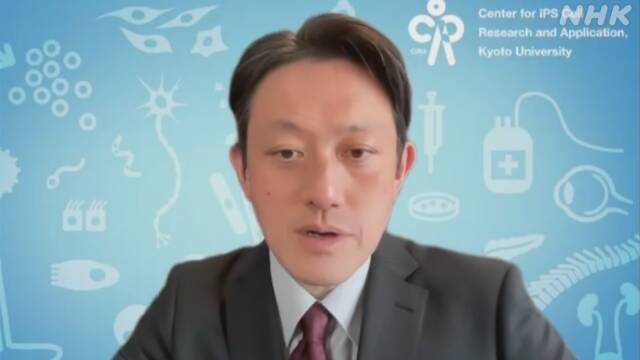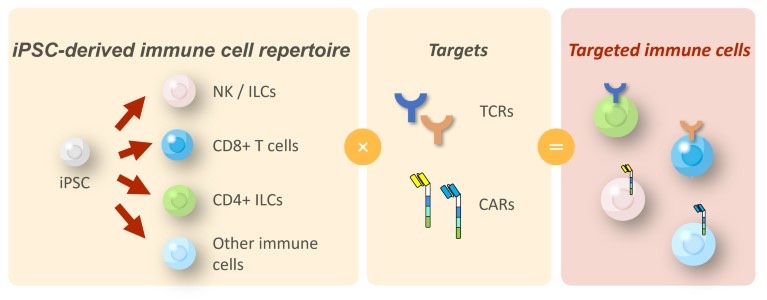

Immune cells: Succeeded in “making with iPS cells”!
-Using iPS to create cancer immunotherapy and immune cells-
Kyoto University:
-Immune cells generated from iPS cells-
About “immune cells used in cancer immunotherapy”
Succeeded in “artificially enhancing cancer attack power using iPS cells”.
Succeeded in an experiment to create immune cells from iPS cells.
Research groups such as Kyoto University made a presentation.
Low cost to patients:
By efficiently producing from iPS cells,
It can be provided to many patients at a low cost.
Kyoto University
iPS Cell Research Institute
New Professor Kaneko
– A research group led by Professor Arata Kaneko of the Center for iPS Cell Research and Application, Kyoto University –
We held an online press conference to announce it.
“CAR-T cell therapy”:
CAR-T cell therapy, one of the immunotherapies for blood cancer patients
Once the patient’s immune cells are taken out of the body,
After incorporating a gene that enhances cancer attack power, it is returned to the body to attack cancer.
Generate immune cells from iPS:
The group created immune cells from iPS cells instead of patient cells.
After being artificially reinforced, it was administered to mice implanted with cancer.
as a result,
In treated mice,
The effect of suppressing the growth of cancer has been confirmed.
NHK | Medical/Health
https://www3.nhk.or.jp/news/html/20221213/k10013920961000.html
Kyoto University: Production of cells that suppress solid tumors
-Use of iPS cells in mice-
iPS Cell Research Institute:
A research group at the Kyoto University iPS Cell Research Institute made a presentation.
Using iPS cells, we created “lymphocytes and T cells that suppress the growth of solid tumors in mice.”
Immunotherapy is expected to be applied to the treatment of solid cancers, which are more difficult than blood cancers.
This paper:
December 13th,
Published in Nature Biomedical Engineering Electronic Edition.
Research team:
“T cells with artificial proteins that activate the function to attack cancer”
Produced from iPS cells.
In order to express the same effect as normal T cells,
Along with removing the genes that interfere with the ability to attack,
A gene was introduced that promotes the activation of the attacking function.
Kyoto University (Jiji Press) – Yahoo! News
https://news.yahoo.co.jp/articles/33d4ba1a928823a0fda37967f7d8c4b8e6d283c5
Cellules immunitaires : Réussir le “faire avec des cellules iPS” !
-Utiliser iPS pour créer une immunothérapie contre le cancer et des cellules immunitaires-
Université de Kyôto :
-Cellules immunitaires générées à partir de cellules iPS-
À propos des “cellules immunitaires utilisées dans l’immunothérapie du cancer”
A réussi à “améliorer artificiellement la puissance d’attaque du cancer à l’aide de cellules iPS”.
A réussi une expérience pour créer des cellules immunitaires à partir de cellules iPS.
Des groupes de recherche tels que l’Université de Kyoto ont fait une présentation.
Faible coût pour les patients :
En produisant efficacement à partir de cellules iPS,
Il peut être fourni à de nombreux patients à un faible coût.
Université de Kyoto
Institut de recherche sur les cellules iPS
Nouveau Professeur Kaneko
– Un groupe de recherche dirigé par le Professeur Arata Kaneko du Center for iPS Cell Research and Application, Kyoto University –
Nous avons tenu une conférence de presse en ligne pour l’annoncer.
“Thérapie cellulaire CAR-T”:
La thérapie cellulaire CAR-T, une des immunothérapies pour les patients atteints de cancer du sang
Une fois que les cellules immunitaires du patient sont retirées du corps,
Après avoir incorporé un gène qui améliore la puissance d’attaque du cancer, il est renvoyé dans le corps pour attaquer le cancer.
Générer des cellules immunitaires à partir d’iPS :
Le groupe a créé des cellules immunitaires à partir de cellules iPS au lieu de cellules de patients.
Après avoir été renforcé artificiellement, il a été administré à des souris implantées d’un cancer.
par conséquent,
Chez les souris traitées,
L’effet de suppression de la croissance du cancer a été confirmé.
NHK | Médical/Santé
Université de Kyoto : Production de cellules qui suppriment les tumeurs solides
-Utilisation des cellules iPS chez la souris-
Institut de recherche sur les cellules iPS :
Un groupe de recherche de l’Institut de recherche sur les cellules iPS de l’Université de Kyoto a fait une présentation.
En utilisant des cellules iPS, nous avons créé “des lymphocytes et des cellules T qui suppriment la croissance des tumeurs solides chez la souris”.
L’immunothérapie devrait être appliquée au traitement des cancers solides, plus difficiles que les cancers du sang.
Ce papier:
13 décembre,
Publié dans Nature Biomedical Engineering Electronic Edition.
L’équipe de recherche:
“Cellules T avec des protéines artificielles qui activent la fonction d’attaque du cancer”
Produit à partir de cellules iPS.
Afin d’exprimer le même effet que les lymphocytes T normaux,
En plus de supprimer les gènes qui interfèrent avec la capacité d’attaquer,
Un gène a été introduit qui favorise l’activation de la fonction d’attaque.
Université de Kyoto (Jiji Press) – Yahoo! Actualités
Immunzellen: „Machen mit iPS-Zellen“ gelungen!
-Verwendung von iPS zur Herstellung von Krebsimmuntherapien und Immunzellen-
Universität Kyoto:
-Aus iPS-Zellen generierte Immunzellen-
Über „Immunzellen in der Krebsimmuntherapie“
Erfolgreich bei der „künstlichen Steigerung der Angriffskraft von Krebs mithilfe von iPS-Zellen“.
Es gelang in einem Experiment, Immunzellen aus iPS-Zellen zu erzeugen.
Forschungsgruppen wie die Universität Kyoto hielten eine Präsentation.
Niedrige Kosten für Patienten:
Durch die effiziente Produktion aus iPS-Zellen
Es kann vielen Patienten kostengünstig zur Verfügung gestellt werden.
Universität Kyoto
iPS-Zellforschungsinstitut
Neuer Professor Kaneko
– Eine Forschungsgruppe unter der Leitung von Professor Arata Kaneko vom Center for iPS Cell Research and Application, Kyoto University –
Wir haben eine Online-Pressekonferenz abgehalten, um dies bekannt zu geben.
“CAR-T-Zelltherapie”:
CAR-T-Zelltherapie, eine der Immuntherapien für Blutkrebspatienten
Sobald die Immunzellen des Patienten aus dem Körper entfernt wurden,
Nach dem Einbau eines Gens, das die Angriffskraft von Krebs erhöht, wird es an den Körper zurückgegeben, um Krebs anzugreifen.
Immunzellen aus iPS generieren:
Die Gruppe erzeugte Immunzellen aus iPS-Zellen anstelle von Patientenzellen.
Nachdem es künstlich verstärkt worden war, wurde es Mäusen verabreicht, denen Krebs eingepflanzt worden war.
als Ergebnis,
Bei behandelten Mäusen
Die Wirkung der Unterdrückung des Krebswachstums wurde bestätigt.
NHK | Medizin/Gesundheit
Universität Kyoto: Produktion von Zellen, die solide Tumore unterdrücken
-Verwendung von iPS-Zellen in Mäusen-
iPS-Zellforschungsinstitut:
Eine Forschungsgruppe am iPS Cell Research Institute der Universität Kyoto hielt eine Präsentation.
Unter Verwendung von iPS-Zellen schufen wir „Lymphozyten und T-Zellen, die das Wachstum von soliden Tumoren in Mäusen unterdrücken“.
Es wird erwartet, dass die Immuntherapie bei der Behandlung von soliden Krebserkrankungen angewendet wird, die schwieriger sind als Blutkrebs.
Dieses Papier:
13. Dezember,
Veröffentlicht in Nature Biomedical Engineering Electronic Edition.
Forschungsgruppe:
“T-Zellen mit künstlichen Proteinen, die die Funktion aktivieren, Krebs anzugreifen”
Hergestellt aus iPS-Zellen.
Um die gleiche Wirkung wie normale T-Zellen auszudrücken,
Zusammen mit der Entfernung der Gene, die die Angriffsfähigkeit beeinträchtigen,
Ein Gen wurde eingeführt, das die Aktivierung der Angriffsfunktion fördert.
Universität Kyoto (Jiji Press) – Yahoo!-Nachrichten
Japanese researchers find efficient way to create immune cells from iPS cells
NHK WORLD-JAPAN News
Japanese researchers say
they have created artificially enhanced immune cells from iPS cells for use in immunotherapy cancer treatment.
A group led by Professor Kaneko Shin at Kyoto University’s Center for iPS cell Research and Application
made the announcement Monday at an online news conference.
In current chimeric antigen receptor-T, or CAR-T, immunotherapy for blood cancer patients, immune cells
are removed from the patients, genetically modified to boost their ability to attack cancer cells, and then returned to the patients.
The researchers say
they derived the immune cells from induced pluripotent stem cells rather than from the patients’ cells.
They artificially enhanced
the anti-cancer properties of the iPS-derived immune cells and infused them into mice implanted with cancer cells.
Kaneko’s team said
the treatment effectively prevented the cancer cells’ growth.
The researchers noted their method costs less than the current CAR-T therapy.
They said
it enables them to create immune cells efficiently from iPS cells at a lower cost that can then be used for many patients.
Kaneko said
new immunotherapies can be developed by combining his method with existing therapies, such as those using anti-cancer drugs.
https://www3.nhk.or.jp/nhkworld/en/news/20221213_07/
Leading the next wave of cancer
immune-cell therapies via allogeneic iPS-Ts Cancer immune-cell therapies are increasing in prominence as breakthrough treatments.
Since 2017,
several chimeric antigen receptor (CAR) T-cell therapies have been approved and have demonstrated excellent therapeutic efficacy in haematologic malignancies.
All of the currently approved CAR T-cell therapies are patient-derived,
and they face two major challenges: variability in the quality and quantity of produced cells; and insufficient efficacy due to cell exhaustion.
The potential use of allogeneic induced pluripotent stem cell (iPSC)-derived T cells (iPS-Ts)
is therefore attracting attention for the stable production and rejuvenation of manufactured immune cells.
Founded in 2015,
Thyas is a Kyoto University spinoff whose research and development
is focused on the clinical application of iPSC-derived immune cells, based on the research advances made by Shin Kaneko at the Centre for iPS Cell Research and Application (CiRA) in Japan.
In 2013, Kaneko — the founder of Thyas —
was the first scientist to accomplish T-cell differentiation from human iPSCs, and to demonstrate in vitro and in vivo efficacy.
Thyas is pioneering immune-cell therapies using iPSCs as an allogeneic source for the treatment of oncological and non-oncological clinical indications.
Its platform technologies
enable Thyas to consistently produce energized immune cells, especially cluster of differentiation 8 (CD8)-α and CD8-β T cells, for clinical studies (Fig. 1).